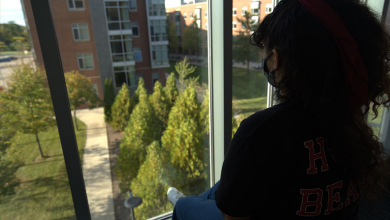
We are hoping by offering these new modalities students can get the support they need.
The COVID-19 pandemic has resulted in many students experiencing increased loneliness, stress, anxiety and depression. Thankfully, there are resources are in place to help address issues they may be dealing with.
As an extension of their existing relationship with ProtoCall Services for afterhours campus counseling, Bridgewater State University recently partnered with Togetherall, an online peer-to-peer mental health community that protects anonymity and is always available.
“We started looking at this service back in February, but because of COVID-19 we thought what better time than now to offer this virtual experience,” said Donna Schiavo, BSU clinical director. “We want to remain present in our students’ lives and let them know we are still here for them even if it’s not face-to-face.”
On the first day Togetherall was offered to Bridgewater students, 47 signed up.
“To me that was a sign that people are intrigued,” Schiavo said.
Through Togetherall, students can interact with a safe and supportive online community.
“Wall guides” are in place to monitor the site around-the-clock. Bullying is not allowed and those who fail to treat others with respect are removed.
If a student makes it known they are in crisis Togetherall contacts BSU.
“If there is an emergency crisis, we are made aware and they will direct the student to us in order for them to get the proper resources,” Schiavo said.
Students don’t have to have be in crisis to use the service, she added.
Aside from the interactive message board, there are other resources available, including self-assessment questionnaires, a private journal and goal-setting tools.
A variety of self-help courses are also offered.
Another online service Bridgewater State has made available and free for students is the WellTrack app.
Like Togetherall, it is secure and anonymous. Students can assess their mental well-being and gain access to resources tailored to help them change thoughts and behaviors that aren’t working for them.
“It can help students track their mood and if they are working with a therapist you can invite your therapist to view your activity,” Schiavo said.
The Wellness Center also offers mental health training for all resident advisers and orientation leaders to help them better recognize when their peers are in distress, and how to best gauge their own anxieties.
“We are hoping by offering these new modalities students can get the support they need,” Schiavo said.
Students can find more information and register either by visiting https://togetherall.com/en-us/or https://www.bridgew.edu/togetherall and from the BSU site here: https://www.bridgew.edu/student-life/wellness-safety/counseling-services .
“We don’t want our students to feel abandoned; our doors aren’t shut,” Schiavo said. “You can still get support.”
Do you have a BSU story you'd like to share? Email stories@bridgew.edu